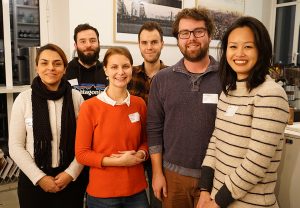
The first Student Board of e-conversion with the GP Coordinator Tayebeh Ameri (on the left) [Photo: Birgit Ziller, e-conversion]
The euphoria and optimism of the cluster´s first year were still clearly noticeable at the kick-off meeting of the graduate program. Five doctoral students at once had registered as candidates for the Student Board and were elected anonymously as a team. One of them, Linh Nguyen, already brings experience from another graduate program: “That’s where I realized how useful such a network is. Especially during the retreats you get to know each other in different way than in the laboratory or at purely scientific events. You discuss much more relaxed and become more creative. And even as a physicist you dare to go to a chemist’s poster …”
A piece of home
Dr. Tayebeh Ameri, coordinator of the graduate program presented its benefits. A winter meeting, a summer retreat lasting several days and an exclusive exchange program with 14 renowned research centers worldwide will be regular features. In addition, the doctoral students will have plenty of room for ideas of all kinds, whether for soft skill courses, company visits or completely new formats. Magnus Bauer showed how versatile and lively this freedom can be shaped. In his short talk “Tales from the past” he gave an insight into his time in the student board of the predecessor cluster NIM. For him, the doctoral program even meant much more than exciting events and a living network: “For me, the graduate program and the cluster have become a piece of home and another ‘family’ next to colleagues from the laboratory.”
Exotics welcome
Most doctoral students, like Magnus Bauer, are physicists or chemists. The only two biologists in e-conversion, Marcel Dann and Milena Zhivkovikj feel somehow exotic. At the chair for Plant Molecular Biology of Dario Leister from the Department of Synthetic Biology, they work on Photosystem I, a protein complex that is responsible for energy production in the photosynthesis of plants and cyanobacteria. Already now there are close cooperations within e-conversion. Together with physicists, they are investigating how to couple the photosystem to graphene electrodes for energy generation. In addition, a chemistry group uses their data to develop a mathematical model of energy transfer processes. “For us, this is the best situation in years!” explains Marcel Dann enthusiastically. “So far, there was only one doctoral candidate for the whole topic. With e-conversion and the ERC grant of Prof. Leister, more people can be hired and we are much better connected. Now we will get somewhere!”
